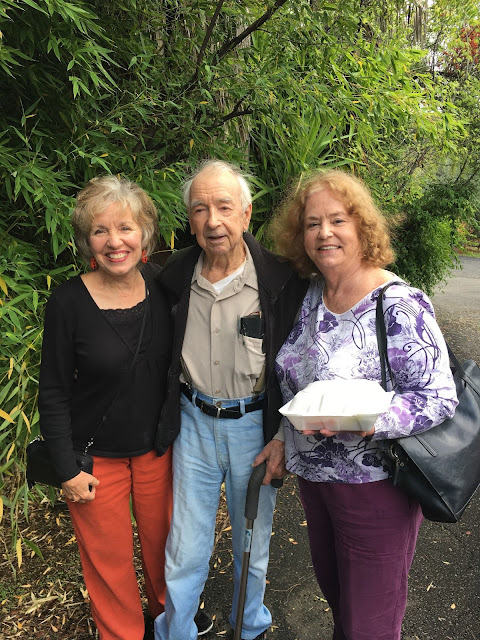There are so many parts of the world that I know absolutely nothing about. Eastern Europe would be one of those. But that's changed now. We just returned from a 3 week River Cruise down the Danube. I've never been on a cruise before. That would still be true if not for our friend Larry Wintersteen. For the third summer he has invited us to go with him and his wife Carol on some sort of trip. This one is the biggest, longest and most expensive. My "been there-done that" husband wasn't particularly keen, but Larry talked us into it. I'm so glad he did!
Several other people joined us on the cruise, making a total of 8 of us that hung together throughout the adventure. Here you can see all of us at the first hotel we went to, the "Seven Day Hotel", in Prague. Left to right, here is Stan and Nancy Beck, Layne, me, Clell Bennett, Roger Armstrong (Carol's brother), Larry and Carol Wiintersteen.
Our first destination was Prague, Czech Republic. It was perhaps the loveliest of all the cities we visited. Here's a map of our journey. The red line marks the Danube and the green line marks our route.
The City of Prague
Prague was stuffed with tourists, but we enjoyed it anyhow. We went on a day's tour with a guide named Deanna. In the center of the picture above you can see the castle which, along with other buildings, is surrounded by a wall. It is the "inner city". The outside is called the "outer city".
From Prague we flew to Romania, where we enjoyed another longer tour through Transylvania. So, what do you think of when you hear Transylvania? Dracula, right? Apparently the author of the book on Dracula patterned him after a real Romanian tyrant, Vlad the Impaler. We visited the famous Bran castle attributed to Dracula, in the town of Bran, Transylvania. So here is the biggest surprise of our trip: Neither Dracula nor Vlad was ever in this castle! Vlad was hardly ever even in Transylvania! So the whole castle/Transylvania thing is a made-up fraud. It was so disillusioning! In spite of this revealing information, the surrounding souvenir shops had lots of Dracula stuff.
Here are Nancy and me, standing inside Bran Castle.
Romani is a lovely country. When our land tour was finished, we drove to Bucharest, where we boarded our cruise ship, the River Aria, a Grand Circle cruise ship. We were so pleasantly surprised, once on board, to see how very nice our accommodations were. Our ship suite was very comfortable and efficient. The crew was friendly and helpful. We were assigned a program director, a very cute girl named Radi, from Bulgaria. She was responsible for us during the whole cruise. She led us on tours and filled us with history. Altogether we visited Romania, the Czech Republic, Hungary, Croatia, Bosnia, and Bulgaria.
Here's Radi and me in front of one of the forts we visited.

These countries are all close together and share a very similar history. In a nutshell, here is my take on their shared experiences from the beginning. Most of the countries were eventually settled by migrating tribes that stopped moving and established communities. They were almost continually invaded by surrounding powers, the Greeks, Romans, Ottoman Turks, Austrian-Hungarian Empire, German Nazis, Russia and Soviet Communism. It was only in 1989, give or take a year, that they all achieved a parliamentary form of democracy. Often these new democracies were run by communists. You may imagine how that worked out. These people have never been free. For generations they have been ruled by various external powers and, occasionally, by their own monarchs. Freedom, then, is difficult to know how to deal with. So, once freedoms were established, recessions set in while the people learned how to be responsible for themselves, to think for themselves, and to establish a means of support. Freedom is difficult when you have been trained to simply obey. It appears that things are greatly improved now. But economies here are still sluggish, and many of the young people go away to school and move to western Europe, where there are more jobs and a higher level of prosperity.
The areas we visited each had their own personalities but also much in common in the way of architecture and organization. Each town has a Church in the center, sometimes used to defend the town. Often there were walls erected around the towns for protection. If there were hills or mountains nearby, there would be a fort at the top, built for defense and to warn the villages of invasions. The rooftops are almost alway of red tile, making the view of the villages from a distance quite lovely.
Most all of the streets and many of the sidewalks were of cobblestones.
Every town has a Church, usually Catholic or Orthodox, They are often big and ornate. The sad thing is that most people never enter them. They stand as monuments to the past, except for a few parishioners. Layne got pretty tired of touring "yet another Church."
The rooftops are almost always made of red tile.
Fortresses often stand on the high ground near the towns. They often had storage rooms so that the townspeople could store emergency supplies.
Here I am inside one of the fortresses, where a soldier's form stood for just such a picture as this.
Our ship had a well organized crew and infrastructure. We ate delicious meals, made up of favorite foods of the countries we passed through and visited. The food presentations were works of art. I told myself before each meal that I wasn't going to eat so much. But I did. I gained a few pounds for sure. But I'd do it all again.
Views from the outdoor level of the ship were lovely. The river is big and moves gently along, creating a welcomed breeze. A damp breeze. My hair went frizzy every time I was up there. But I went anyhow.
Here's Layne and Larry, enjoying the view and the breeze from the top.
A view of the Danube River, from land.
A Danube River sunset, taken from our cabin window.
Our ship, the River Aria.
There was an amazing amount of graffiti in every country. When I asked why, Radi said that some see it as just an art expression and even if they are upset by it, no one does anything about it. So it becomes ever more common, compromising the beauty of many of the buildings. Radi explained that once infrastructure, like roads, bridges, and such, to up, there is no maintenance. So many things are deteriorating.
There are signs of former communism everyplace as well. The grey, depressing buildings stand in stark contrast to the lovely, ornate buildings of former times. Here Layne stands by one of the Communist statues still standing that illustrate the working masses.
Everything here is old. The buildings are lovely however. Here you can see the style of city buildings that are common everywhere we visited.
There is so much more to say, but I'm done for now. We spent 24 hours traveling home, arriving on Wednesday night, so very tired. Our ride home was an hour late and once we got home we discovered that we were locked out of the house! We staggered around until Layne found a window he could pry open. I climbed through the kitchen window to finally get us inside. We fell into bed. But we both woke up at 4 AM. It's been that way for the past several days. But this will pass and if I were to choose to make this trip again...I would!














































































